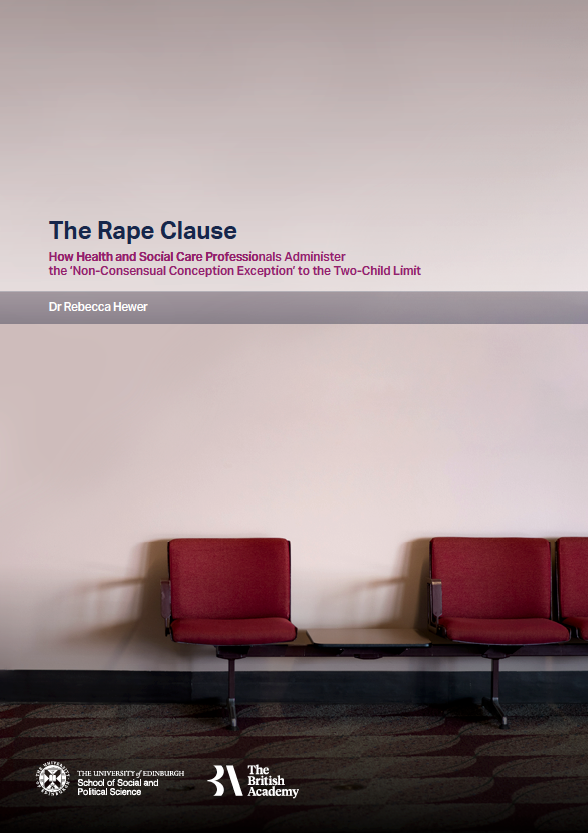The Rape Clause
Overview
Description
In this project, Dr Rebecca Hewer critically interrogates the frontline administration of the UK government’s controversial ‘non-consensual conception exception’ to its two-child limit. This exception, colloquially known as the ‘rape clause’ allows survivors of sexual violence to claim otherwise unavailable subsistence level benefits, if they are prepared to ‘evidence’ that their third or subsequent was born following sexual violence.
Drawing on interviews with thirteen health and social care practitioners, Hewer explores how professionals tasked with certifying eligibility for this ‘rape clause’ exception would go about doing so, in practice. She identifies numerous obstacles that stand between potential rape clause recipients and the timely, consistent, and equitable certification of their eligibility. In turn, she raises significant concerns regarding the design, implementation, and fundamental workability of this policy.
On this page you will find details of key findings, recommendations and notable outputs including a detailed research report and policy brief. You will also find links to government information about, and guidelines for, the administration of the ‘non-consensual conception exception’.
Report
 | The Rape Clause How Health and Social Care Professionals Administer the 'Non-Consensual Conception Exception' to the Two-Child Limit Report Download (PDF) Policy Brief download (PDF) |
Key Findings
- Practitioners have very limited knowledge of the rape clause or the demands made of them as approved third-parties.
- Practitioners need time and tailored resources to prepare to certify rape clause eligibility. There are very few tailored resources available, and the health and social care sector is stretched to capacity.
- Whilst, in theory, all claimants should have access to an approved third-party (due to ‘universal service’ involvement) many will encounter foreseeable obstacles to access, e.g., waiting lists, non-clinical triage, and restrictive service eligibility criteria.
- The state has failed to identify a clear standard of, or threshold for, ‘non-consensuality’, for the purposes of rape clause administration. They have left this complex and challenging task to the discretion of individual practitioners.
- Most practitioners say they would take a light touch approach to certifying rape clause eligibility, assuming high levels of survivor credibility and defining sexual violence in accordance with a survivor’s subjective experience.
- Practitioners lack confidence in their ability to contradict a survivor’s account of sexual violence and do not, therefore, feel qualified to deny certification of rape clause eligibility.
- Practitioner reflections on how they would contradict a survivor’s account – if they felt obliged to do so - reveal scope for mishandled cases and inequitable provision, largely due to confusion about what constitutes rape, alongside rape myth acceptance, and the failure of the state to provide a threshold definition of non-consensuality.
- A large subset of practitioners, working for statutory agencies would feel duty bound to take action with respect to adult and child safeguarding if they heard a disclosure of sexual violence, which would likely necessitate invasive enquiries and, in some circumstances, unwanted interventions.
Practitioners would be more comfortable certifying rape clause eligibility if they were already aware that a service user had experienced a non-consensual conception or long-term intimate partner violence. Practitioners are concerned about the relational challenges and therapeutic implications of certifying rape clause eligibility for a new service user, or a service user who has not previously disclosed an experience of sexual violence.
Recommendations
- Given the demonstrable unworkability of the rape clause, this report recommends the repeal of the two-child limit.
In the interim (if repeal of the two-child limit is delayed)
- Given that practitioners either credential (rather than verify) survivor’s disclosures of sexual violence or run the risk of using contested and variable definitions of rape to deny certification, this report strongly recommends that the state move away from using a third-party evidence model to demonstrate rape clause eligibility and towards a self-certification model.
In the interim (if a self-certification model is not adopted)
- Given recurrent access challenges related to current approved third parties, and the importance of allowing survivors to choose whom they confide in, this report recommends that the Secretary of State immediately increase the kind of professionals with approved third-party status.
Given that knowledge and understanding of the rape clause appears to be low, and that this may frustrate sensitive and effective case handling, this report recommends that the state build rape clause knowledge and capacity among approved third-party professionals.
Rape Clause Resources
Research themes
- Gender, Feminism and Sexuality
- Governance of welfare states